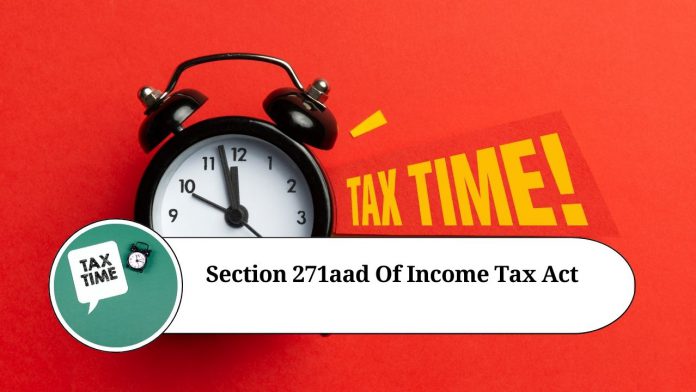The Indian Income Tax Act, of 1961, is a comprehensive piece of legislation that lays down the provisions for the taxation of income in India. The Act contains various provisions that prescribe the rules and regulations for filing income tax returns, paying taxes, and claiming deductions and exemptions.
One of the critical provisions of the Income Tax Act is Section 271AAD, which deals with the penalties for the late filing of income tax returns. This section was introduced in the Finance Act, of 2017, and is applicable from April 1, 2017
Understanding the Provisions of Section 271AAD
Section 271AAD of the Income Tax Act prescribes a penalty for the late filing of income tax returns. The penalty is in addition to the interest and other penalties that may be applicable for non-payment or delayed payment of taxes.
Under Section 271AAD, if a person fails to file an income tax return within the due date, he/she may be liable to pay a penalty of Rs. 5,000. The penalty will be levied if the income tax return is filed after the due date but on or before December 31 of the assessment year.
If the income tax return is filed after December 31 of the assessment year, the penalty amount increases to Rs. 10,000. However, if the total income of the person does not exceed Rs. 5 lacks, the penalty amount will be limited to Rs. 1,000.
It is important to note that the penalty under Section 271AAD is mandatory and cannot be waived by the assessing officer. The penalty is also applicable even if the person has no tax liability or has already paid the taxes due.
Exceptions to Section 271AAD
While Section 271AAD prescribes a penalty for the late filing of income tax returns, there are some exceptions to the provision. These exceptions are as follows:
- If the person can prove that there was reasonable cause for the delay in filing the income tax return, the penalty may be waived.
- If the person is a small taxpayer, i.e., the total income does not exceed Rs. 5 lahks, the penalty may be limited to Rs. 1,000.
- If the person is a senior citizen or a person with a disability, the penalty may be waived or reduced.
- If the person has filed a belated income tax return voluntarily before the issuance of a notice by the assessing officer, the penalty may be waived or reduced.
Importance of Section 271AAD
Section 271AAD is an essential provision of the Income Tax Act as it encourages taxpayers to file their income tax returns on time. The penalty prescribed under this section serves as a deterrent to those who may be inclined to delay filing their returns.
Timely filing of income tax returns is not only a legal requirement but also essential for maintaining financial discipline. By filing their returns on time, taxpayers can avoid the penalty, interest, and other charges that may be levied on them.
Conclusion
In conclusion, Section 271AAD of the Income Tax Act prescribes a penalty for the late filing of income tax returns. The penalty is mandatory and applicable even if the person has no tax liability or has already paid the taxes due.
While the penalty under this section can be significant, some exceptions and provisions provide relief to taxpayers who may have a reasonable cause for the delay in filing their returns. Taxpayers need to understand the provisions of Section 271AAD and ensure that they file their income tax returns on time to avoid the penalty and maintain financial discipline.
Read more useful content:
Frequently asked questions (FAQs) regarding Section 271AAD of the Income Tax Act:
Q: What is Section 271AAD of the Income Tax Act?
A: Section 271AAD of the Income Tax Act is a provision that deals with the penalty for failure to keep or maintain proper books of accounts by a person who is required to do so under the provisions of the Income Tax Act.
Q: Who is required to maintain proper books of accounts?
A: Every person who carries on any business or profession and whose total sales, turnover, or gross receipts exceed Rs. 2,50,000 in any previous year is required to maintain proper books of accounts.
Q: What is the penalty for failure to maintain proper books of accounts?
A: The penalty for failure to maintain proper books of accounts is Rs. 25,000.
Q: Who can impose a penalty under Section 271AAD?
A: The penalty under Section 271AAD can be imposed by the Assessing Officer.
Q: Can the penalty under Section 271AAD be imposed for any year?
A: No, the penalty under Section 271AAD can only be imposed for the previous year in which the failure to maintain proper books of accounts occurred.
Q: Is there any defense available to avoid the penalty under Section 271AAD?
A: Yes, if the person can prove that there were reasonable causes for the failure to maintain proper books of accounts, the penalty can be avoided.
Q: Is there any provision for reducing the penalty under Section 271AAD?
A: Yes, if the person voluntarily discloses the failure to maintain proper books of accounts before any notice is issued by the Assessing Officer, the penalty can be reduced to Rs. 10,000.
Q: Can the penalty under Section 271AAD be appealed against?
A: Yes, the penalty under Section 271AAD can be appealed against the Commissioner of Income Tax (Appeals).




















